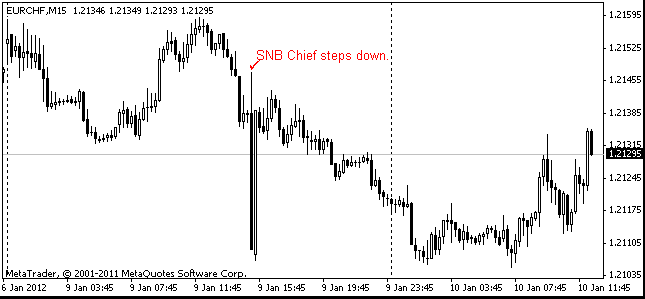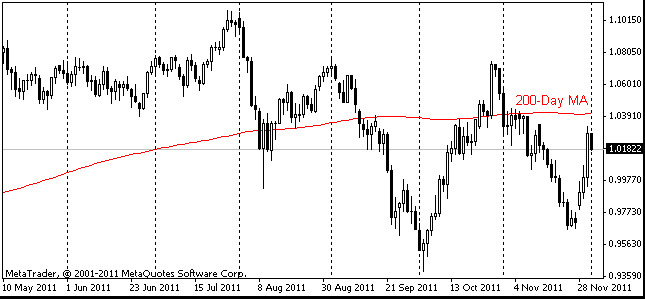EUR/usd
They say that the most successful deals to buy stocks are made when the markets are quaking with fear and the forecasts differ only in the shades of black. Last week it seemed that the American stock exchange was involved in that very buying on the dips. But it should be mentioned that at the same time the euro and high-beta currencies hit new local lows. Against our expectations, speculators decided to make the most of the decline last week, thus triggering further sales on Friday. The euro sank close to 1.25. The markets first spread the rumour that Greece would use the coming long weekend to announce their exit from the euro bloc. However, by day's end the attention had shifted to Spain, whose autonomous region Catalonia was said to be on the verge of bankruptcy. If true, the country's debt situation would be much aggravated. However, nothing of the kind happened during the weekend, so the single currency breathed a sigh of relief, having jumped from the Friday level of 1.25 up to the 1.2590 level at early trading on Monday. This is close to the highs of the preceding session. So, no bad news is good news again. Let's turn back to the US stock market despite the fact that there won't be any trading today. Judging by the charts, the market participants are actively buying assets on the dips now. The charts show the birth of a bounce, which can well affect the course of trading today. With such a mood the euro can try to break above 1.2630/50. However, be careful when opening long-term positions. In our opinion, the current recovery attempt is nothing more than a bounce with a chance to turn into consolidation. The government supported Spanish Bankia asks for the €19bln bailout and plans to get it from the ECB, using government bonds as collateral. It looks as though the ECB was now involved not only in bailing out sovereign states, but also in saving the banking sector. If the Bank doesn't mind it, it will be a new stage of integration as the CBs of Japan, Britain and the USA have already taken an active part in saving their banking sectors from collapse.

GBP/USD
As there is no important domestic news, the British pound has to follow the major market sentiments and movements. Thus, coming after the euro it is now consolidating a bit below 1.57. A few days ago this level served as an important line of support and now may turn into a strong level of resistance. However, it doesn't really mean that the markets won't break through it today. You see, the chances to consolidate above the mark by the end of the day and not to drop at the beginning of more active trades are really slim. Yet, the British currency can derive some support from the housing market data. The Hometrack house price survey has shown a cut in the decline rate in May (-0.6% against -0.9% a month before) and upon the whole keeps demonstrating a steady improvement since last July. The respondents who took part in the survey noted a certain decrease in the house selling timeline, though this figure still remains very high. But be careful. Under current circumstances the price growth is followed by increase in supply, which shortly afterwards leads to a cut in prices. Now we already have the first and the second factors, so the third one is soon to come.

EUR/CHF
The Swiss franc keeps showing some signs of life. The events at the end of the last week managed to revive the rate and now its fluctuations go beyond 2-3 points in EUR/CHF. The pair itself is hovering around 1.2020, though on Friday it rose up to 1.2040 and fell down to 1.2005. Actually, there are too many long positions in the pair as the NSB has so far stuck to keeping the lower boundary at 1.20 and the actual demand for francs hasn't given the pair a chance to go up much. Besides, the difference in the interest rates let these speculators profit from the risk-free carry trade. It's become a bit more difficult now, but no more than that.

AUD/USD
The demand for risky assets and profit taking in dollars played right into the aussie's hand. The AUD/USD rate has willingly bounced off the last week's lows and has already grown by more than a point since opening. The pair is now at 0.9860. This is where the traders have really sighed with relief on the more or less encouraging reports from Greece – it's again rumoured that the parties which support the bailout programme are taking the upper hand.
